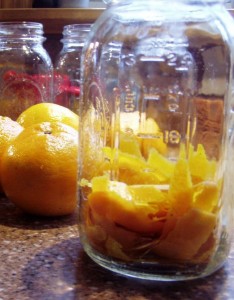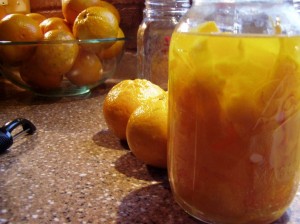 At this time of the year, you might find yourself with a box of oranges as a gift (or, as part of a fund-raiser). Now, you can certainly eat them and toss the orange rinds. No one would fault you for that (although there are a lot of things you can do with orange rinds including making your own citrus cleansers and furniture polishes), but here is another way to use them that can actually provide you with a holiday gift later on: Making orange extract.
At this time of the year, you might find yourself with a box of oranges as a gift (or, as part of a fund-raiser). Now, you can certainly eat them and toss the orange rinds. No one would fault you for that (although there are a lot of things you can do with orange rinds including making your own citrus cleansers and furniture polishes), but here is another way to use them that can actually provide you with a holiday gift later on: Making orange extract.
So, what, precisely are we extracting when we make this stuff?
Well, 95% of the oils in an orange peel is made up of a substance called d-limonene, which is a relatively stable hydrocarbon that gives off that characteristic ‘Oh, someone is opening an orange” smell. It has found widespread use in the chemical industry as an ingredient for cleansers and degreasers. It is also the ingredient that makes orange extract add that characteristic smell and taste to baked goods and other products.
Like the vanilla extract recipe,vanilla extract this is simplicity itself. As a matter of fact, it is even easier.
First, you are going to want to use oranges which have really thick skins. Those will have the most ‘orange oil’ in them and are the easiest to peel in terms of getting the orange stuff off (it’s either that or a grater; I think using a vegetable peeler is easier)without having any of the white pithy stuff that is underneath it. You don’t want any of that in your extract mix because it will make it bitter. Second, you want to give the oranges a really good scrubbing. If you have the blessing of having organic oranges available to you – fantastic, you’ll just want to make sure they are scrubbed up well. For anything else (which means everything else), put a couple of drops of dish washing detergent in the water, scrub the oranges well, and rinse, rinse, rinse.
Here is the basic mix: You will need vodka or white rum. Again, get the cheapest stuff you can find. One big bottle is a liter, which is approximately 34 ounces (which works out to 4 cups and two left over ounces in a bottle).
For every quart Mason(tm) jar:
Peel of 7 oranges
3 cups of white rum or vodka
The jar, once you put everything into it, should look like this: Seal up the jar with a screw top or a piece of plastic topped by a canning jar lid and ring. Shake up the jar and put it away in a cool dark place for several weeks, taking it out to shake it every couple of days. You can use it as is, or strain out the liquid into another bottle with a cork or screw top and use it in any recipe that you’d use orange extract, including baked goods or in items such as cocktails.
Seal up the jar with a screw top or a piece of plastic topped by a canning jar lid and ring. Shake up the jar and put it away in a cool dark place for several weeks, taking it out to shake it every couple of days. You can use it as is, or strain out the liquid into another bottle with a cork or screw top and use it in any recipe that you’d use orange extract, including baked goods or in items such as cocktails.
Bon Appetit!!

It’s nice to have one’s own miniature orange tree (calamondin); the mini oranges are perfect teeny-tiny replicas of a clementine, and the peel has no bitter pith. Plus , they are super fragrant; a friend made marmalade with a bowl of them that I presented to him, and he said the whole house was perfumed every time he opened the jar!